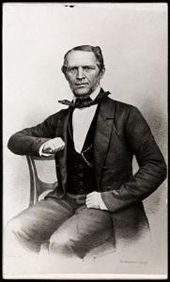Friedrich August Reissiger
Friedrich August Reissiger (born July 26, 1809 in Belzig , Kingdom of Saxony ; † March 1, 1883 in Halden , Norway ) was a German composer , organist , music director , vocal teacher and conductor .
Life
Reissiger's father, Christian Gottlieb Reissiger (1762–1825) was a cantor in Belzig, the older brother Carl Gottlieb Reissiger was a composer and conductor. Friedrich August learned the piano and violin from his father and already represented his father as an organist in his youth. At the age of thirteen he came to Leipzig to the Thomas School and sang in the St. Thomas Choir . From 1830 he studied theology in Berlin , but also music under Siegfried Dehn and was a member of the Sing-Akademie zu Berlin since 1834 .
In 1840 he went to Christiania to the Christiania Theater , built in 1837, where he became music director in 1843 and from then on stayed in Norway, whose musical life he played a major role. In his ten years as music director he performed 33 operas, 13 of which were new works. At the same time he worked as an organist in a Catholic church, directed the Christiania Musical Association Philharmonic Orchestra and had some students, such as Johan Didrik Behrens (1820–1890), whom he taught in music theory . In 1850 Reissiger had a position as organist of the Immanuel Church in Halden, the place where most of his compositions were written.
As a composer he concentrated on the genres of the song and piano music, but also wrote military music , cantatas , composed the Requiem on the occasion of the death of King Karl Johans (1844) and performed Sæterjentens Søndag (1851), (text: Jørgen Moe ) for male choir and piano. At the World Exhibition in Paris in 1878 , the work Olaf Trygvason from 1864 was performed by students from Norway and Sweden .
In 1875, Reissiger was awarded the Saint Olav Order for his efforts to promote musical life in Norway .
Works (selection)
- Du är liksom en blomma (text based on Heinrich Heine's You are like a flower from the book of songs )
- Four songs , op.2.
- No. 1. Lied (Text: Heinrich Heine)
- No. 3. Farewell (Text: Heinrich Heine)
- Chants and songs for a tenor or soprano part with accompaniment of the piano forte composed and kindly dedicated to the royal court opera singer, Mr. Edurd Mantius, op.17 . Gustav Crantz, Berlin approx. 1836
- Noah's legacy . A story with a bass or baritone voice. Dedicated to his friend the royal singer, Mr. Bötticher, op.23 Gustav Crantz, Berlin approx. 1838
- Songs and Chants, op.28
- No. 1. Lied (Text: Heinrich Heine)
- New fairy dance . Collection of Original dances for the piano forte a. a., op.50, Leipzig, CA Klemm, approx. 1860
- op. 96.
- No. 8. Song by H. Heine (Text: Heinrich Heine)
- Requiem in memory of King Carl XIV Johan of Sweden, at the same time Charles III. John of Norway 1844
- Olaf Trygvason (1864)
- Festival March (1875)
- Dear Fritz . Side piece to little Hans by Fr. Curschmann for a voice with accompaniment of the pianoforte or the guitar. CA Challier, Berlin approx. 1837
literature
- Leif J. Ryan: Friedrich August Reissiger: Hans Liv Og Virke Fra 1809–1883 , ISBN 9788281120174 , Norske bker, 2004
Web links
- Sheet music and audio files by Friedrich August Reissiger in the International Music Score Library Project
- List of stage works by Friedrich August Reissiger based on the MGG in Operone
Individual evidence
- ↑ Sæter as in Seter , jenten as in Mädchen. Søndag is Norw. for Sunday. Sunday for the alpine girl .
| personal data | |
|---|---|
| SURNAME | Reissiger, Friedrich August |
| ALTERNATIVE NAMES | Reissiger |
| BRIEF DESCRIPTION | Composer, organist, bandmaster, singing teacher and conductor in Norway |
| DATE OF BIRTH | July 26, 1809 |
| PLACE OF BIRTH | Belzig , Kingdom of Saxony |
| DATE OF DEATH | March 1, 1883 |
| Place of death | Halden , Norway |

